Do you find yourself exhausted despite adequate sleep? Are your cravings for carbohydrates seemingly uncontrollable? Have you hit a frustrating weight loss plateau despite your best efforts? These could all be signs of insulin resistance – a metabolic condition that affects nearly half of all adults worldwide and often silently progresses for years before diagnosis.
When it comes to addressing insulin resistance, the supplement industry offers countless “miracle solutions” – but which supplements for insulin resistance actually have scientific merit behind them? Which ones might be worth your investment, and which are simply clever marketing without substance?
At Dubai Nutrition Clinic, we’re committed to providing clarity through the confusion. Today, we’ll thoroughly examine the scientific evidence behind the most promising supplements for insulin resistance. No exaggerated claims – just a comprehensive analysis of what research actually shows about supplements that may help support healthy insulin function.
Whether you’re currently managing insulin resistance, concerned about prediabetes, or simply looking to optimize your metabolic health, this evidence-based guide will help you make informed decisions about which supplements might complement your overall approach to better health.
Important Notice
The supplements discussed in this article should not be considered as primary treatments for insulin resistance or related conditions. They are meant to complement, not replace, proper medical care, appropriate dietary changes, regular physical activity, and other lifestyle modifications.
Individual responses to supplements vary significantly, and some may interact with medications or be contraindicated for certain medical conditions. Always consult with a healthcare professional before starting any supplement regimen, particularly if you have existing health conditions or are taking medications. The information provided here is educational and not intended as medical advice.
Magnesium: The Essential Mineral for Glucose Metabolism

Magnesium stands out as one of the most promising supplements for insulin resistance, with substantial research supporting its metabolic benefits. This essential mineral plays a crucial role in over 300 enzymatic reactions in your body, many directly involved in how your cells process glucose.
What Research Shows About Magnesium and Insulin Sensitivity
Multiple clinical studies have demonstrated magnesium’s positive effects on insulin resistance. A systematic review published in the journal Nutrients found that magnesium supplementation significantly improved glucose parameters and insulin sensitivity in people at high risk of developing diabetes. The improvements were most notable in those with low magnesium levels—a condition surprisingly common in today’s population.
“Many patients with insulin resistance have suboptimal magnesium levels despite normal blood tests. This occurs because only 1% of the body’s magnesium is in the bloodstream, with the remaining 99% stored in bones and inside cells. This is why addressing magnesium status often improves metabolic markers before changes in blood glucose appear.”
Dr. Babak Jamalian, Family Physician.
How Magnesium Supports Insulin Function
Magnesium acts like a key that helps insulin work properly. Without sufficient magnesium, your cells’ insulin receptors become less responsive—imagine a door with a rusty lock that won’t open smoothly even when you have the right key. Magnesium helps activate insulin receptors, supports glucose transport into cells, and regulates insulin release from the pancreas.
Types of Magnesium Supplements
Not all magnesium supplements are created equal. For insulin sensitivity, magnesium citrate and glycinate are often recommended due to their better absorption profiles. Magnesium oxide contains more elemental magnesium by weight but is less well absorbed, while forms like magnesium malate and threonate have their own unique properties and potential benefits.
On the IFitCenter blog, we have published a free content bank about insulin resistance that can have a significant impact for you in controlling and preventing this metabolic disease. For access, simply use the links below:
- insulin resistance definition
- how to reverse insulin resistance
- insulin resistance signs
- test for insulin resistance
- Can Fasting Reverse Insulin Resistance?
Berberine: The Natural Supplement for Insulin Resistance
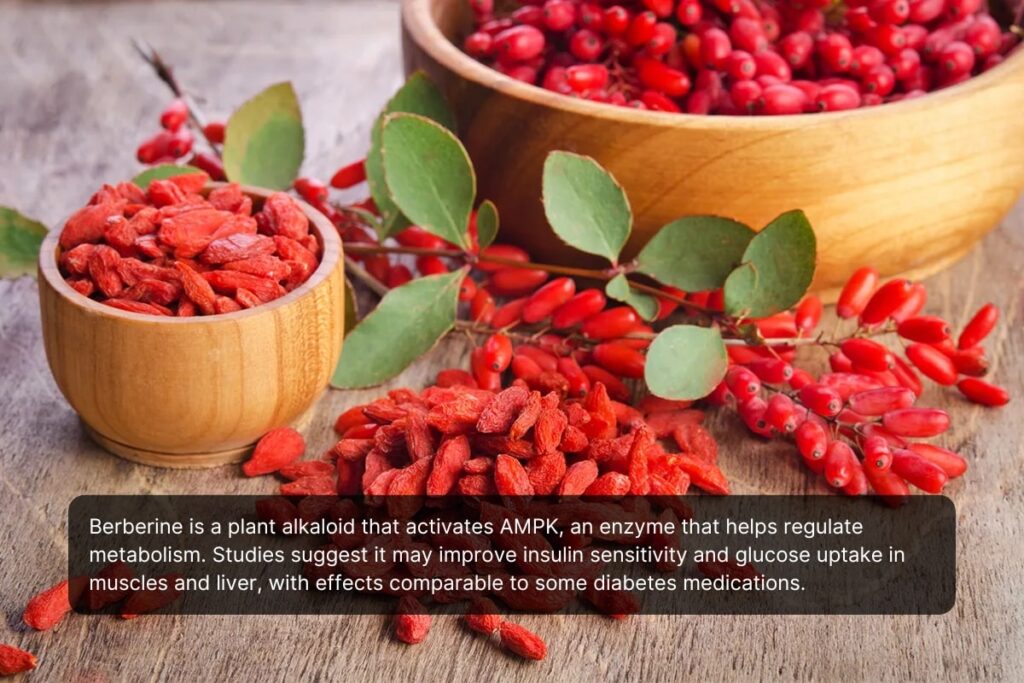
Berberine is a plant alkaloid extracted from several plants including Berberis vulgaris (barberry) and Coptis chinensis (goldthread). It has gained attention for its impressive effects on insulin sensitivity and glucose metabolism, with research suggesting comparable efficacy to some conventional medications used for insulin resistance.
How Berberine Improves Insulin Sensitivity
Berberine primarily works by activating an enzyme called AMP-activated protein kinase (AMPK), sometimes referred to as the body’s “metabolic master switch.” When activated, AMPK improves the body’s ability to use glucose and enhances insulin sensitivity. Berberine also appears to reduce glucose production in the liver and increase glucose uptake in muscle cells – both critical factors in addressing insulin resistance.
Multiple clinical studies have examined berberine’s effects on insulin resistance. In a key randomized controlled trial published in Metabolism, berberine improved insulin sensitivity in patients with metabolic dysfunction. These improvements were comparable to conventional treatments, suggesting it may be a viable natural option for supporting insulin function.
While promising, berberine may interact with certain medications, particularly those processed by the liver. This includes many diabetes medications, blood thinners, and certain antibiotics. Pregnant and breastfeeding women should avoid berberine due to limited safety data. The most common side effects involve the digestive system, which typically improve as the body adjusts to the supplement.
“Berberine activates AMPK (AMP-activated protein kinase) through pathways similar to physical exercise, which is why it can be particularly beneficial for patients who have mobility limitations or are just beginning their metabolic health journey. However, it should always complement rather than replace lifestyle modifications as the body responds more comprehensively to exercise than to any supplement.”
Dr. Babak Jamalian, Family Physician.
Chromium: The Trace Mineral for Glucose Regulation
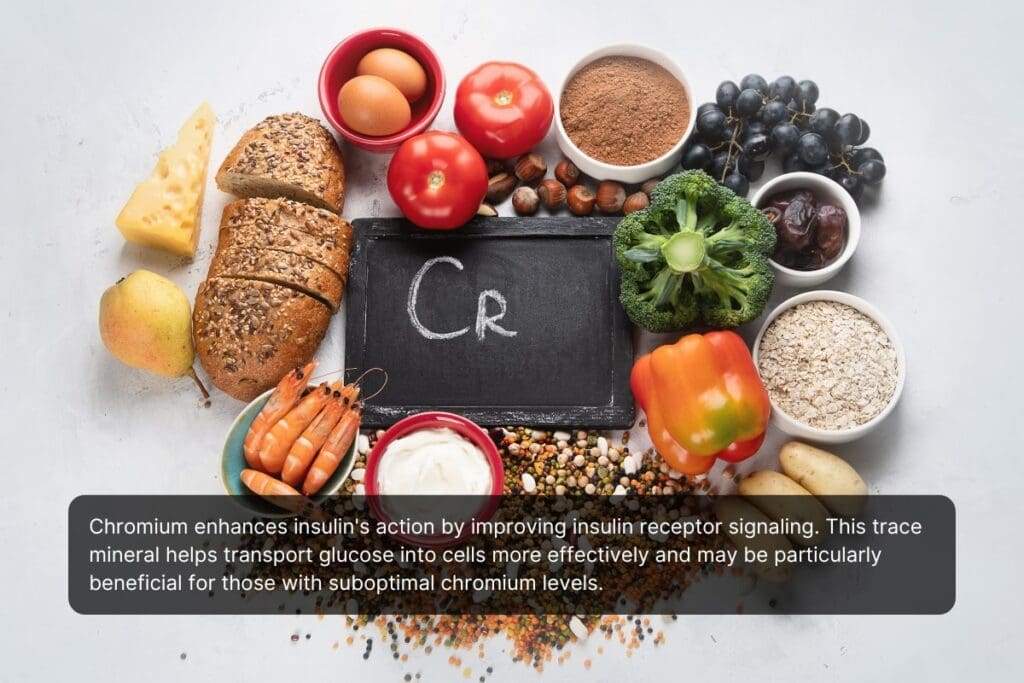
Chromium is an essential trace mineral that plays a key role in carbohydrate and lipid metabolism. Research has identified chromium as an important factor in enhancing insulin sensitivity and improving glucose metabolism, making it a supplement of interest for those with insulin resistance.
How Chromium Supports Insulin Function
Chromium enhances insulin action through several mechanisms. At the cellular level, chromium appears to increase insulin binding to cell surface receptors and improve insulin signaling after it binds. It also plays a role in the function of Glucose Tolerance Factor (GTF), a biological compound that works alongside insulin to facilitate glucose uptake into cells.
Research published in the Journal of Clinical Pharmacy and Therapeutics shows that chromium supplementation can improve markers of insulin resistance in certain populations. The most significant benefits appear in individuals with existing chromium deficiency, which is more common than once thought. Modern agricultural and food processing practices have reduced the chromium content in many foods, while diets high in simple sugars can increase chromium excretion.
People with stronger insulin resistance may experience more noticeable benefits from chromium supplementation. This includes individuals with prediabetes, metabolic syndrome, and those with difficulty maintaining healthy glucose levels despite lifestyle modifications. Elderly individuals may also benefit, as chromium levels naturally decline with age.
While generally considered safe, chromium may interact with certain medications including antacids, proton pump inhibitors, corticosteroids, and some diabetes medications. Those with kidney or liver disease should consult healthcare providers before supplementing. Chromium picolinate, one of the most common forms used in research, has shown good safety profiles in studies, though some research suggests that very high doses over extended periods should be approached with caution.
Supplements Alone Aren’t Enough – Personalize Your Approach
The true effectiveness of supplements in managing insulin resistance emerges when combined with nutritional strategies, physical activity, stress management, and medical supervision. At IFitCenter, we don’t just recommend supplements—we create comprehensive, evidence-based metabolic health plans.
Our holistic approach includes:
✔ Tailored nutritional advice that complements your supplementation
✔ Structured exercise programs to enhance insulin sensitivity naturally
✔ Professional monitoring to ensure safe and effective progress
Start your comprehensive insulin resistance management journey today.
Alpha-Lipoic Acid (ALA): The Universal Antioxidant for Insulin Sensitivity
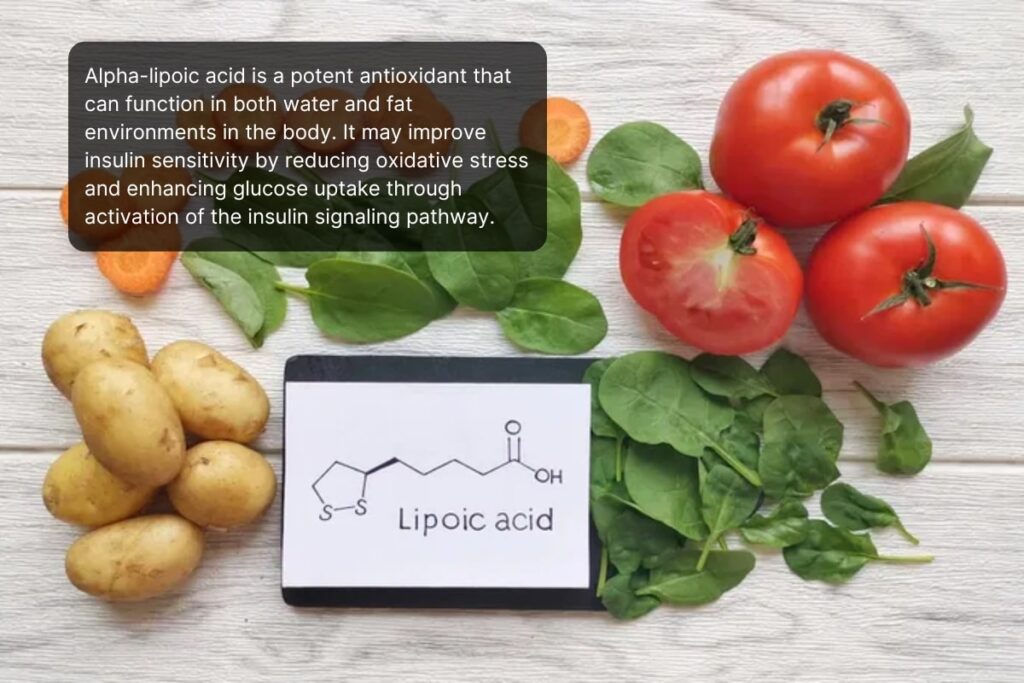
Alpha-lipoic acid (ALA) is a naturally occurring compound that serves as a powerful antioxidant in the body. Unlike most antioxidants that work only in water (like vitamin C) or only in fatty tissues (like vitamin E), ALA functions in both environments, earning it the designation of a “universal antioxidant.” This unique property makes it particularly valuable for addressing insulin resistance.
How Alpha-Lipoic Acid Improves Insulin Function
Alpha-lipoic acid enhances insulin sensitivity through multiple mechanisms. Research published in the journal Hormones shows that ALA supplementation can improve insulin sensitivity in people with metabolic challenges. At the cellular level, ALA activates an important enzyme called AMP-activated protein kinase (AMPK), similar to the action of berberine and physical exercise. This activation helps cells respond more effectively to insulin signals.
As an antioxidant, ALA helps neutralize harmful free radicals that contribute to insulin resistance. Oxidative stress damages cellular components, including insulin receptors, and ALA helps protect these structures. Additionally, ALA supports mitochondrial function, enhancing cellular energy production and glucose utilization. This dual role as both an antioxidant and insulin sensitizer makes it particularly effective for metabolic support.
Beyond improving insulin sensitivity, ALA offers additional benefits that support metabolic health. It helps reduce inflammation, a key factor in insulin resistance. ALA also supports healthy nerve function, making it valuable for those experiencing complications related to long-standing metabolic challenges. Some research suggests ALA may support healthy blood lipid levels and blood pressure regulation, further contributing to overall metabolic health.
While generally well-tolerated, ALA may cause digestive discomfort in some individuals. It may enhance the effects of diabetes medications, potentially increasing the risk of hypoglycemia, so monitoring is important if you’re taking glucose-lowering medications. Those with thyroid conditions should use caution, as some research suggests ALA might influence thyroid hormone function. As with any supplement, pregnant and breastfeeding women should consult healthcare providers before using ALA.
Inositol: Promising Support for PCOS-Related Insulin Resistance
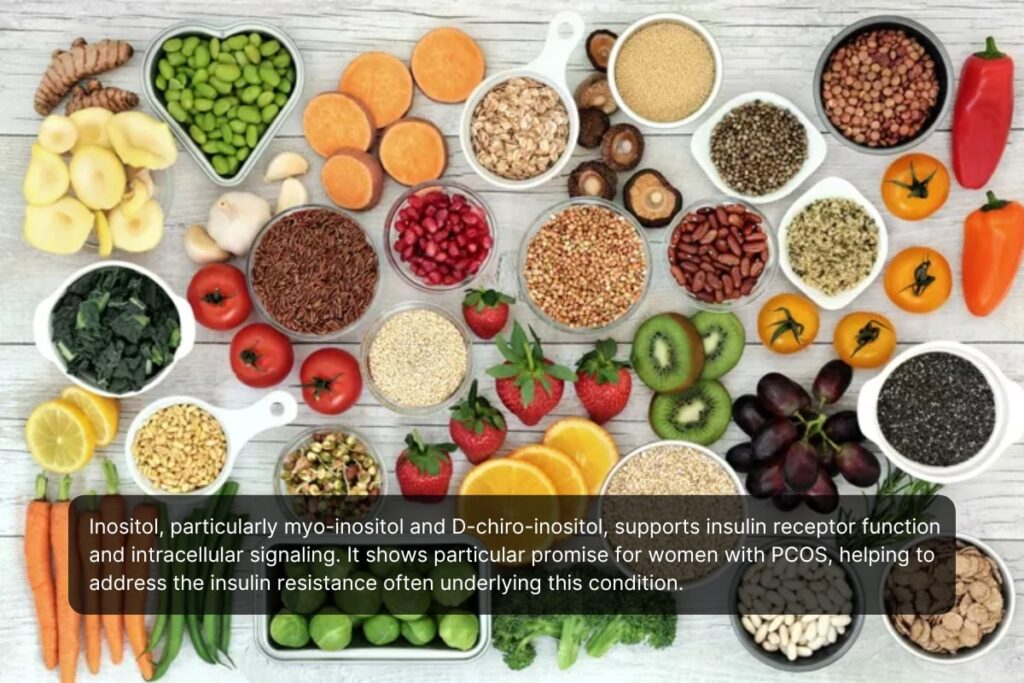
Inositol is a naturally occurring compound that exists in several forms, with myo-inositol and D-chiro-inositol being the most studied for metabolic health. These compounds function as secondary messengers in insulin signaling pathways, playing an important role in how cells respond to insulin, particularly in tissues affected by polycystic ovary syndrome (PCOS).
Inositol’s Role in Improving Insulin Sensitivity
Research published in Gynecological Endocrinology shows that inositol supplementation can significantly improve insulin sensitivity in women with PCOS. Myo-inositol helps enhance cellular glucose uptake by improving insulin receptor function, while D-chiro-inositol supports glycogen synthesis in the liver and muscles. The combination of these two forms appears to address insulin resistance through complementary mechanisms.
Inositol’s effects appear most pronounced in women with PCOS, a condition characterized by hormonal imbalances and often accompanied by significant insulin resistance. In PCOS, insulin resistance contributes to many symptoms including irregular menstrual cycles, excess androgen production, and metabolic disturbances. By addressing the underlying insulin resistance, inositol may help improve both metabolic and reproductive aspects of PCOS.
While women with PCOS show the most consistent benefits, research suggests inositol may also support insulin sensitivity in others with metabolic syndrome or prediabetes. Those with a family history of type 2 diabetes might also benefit from inositol’s insulin-sensitizing effects, as genetic predisposition often involves similar mechanisms of insulin resistance.
Inositol has an excellent safety profile with minimal side effects. The most commonly reported issues are mild digestive symptoms like nausea or diarrhea, which typically resolve as the body adjusts. No significant drug interactions have been identified, making inositol suitable for consideration alongside other treatments. However, as with any supplement, those who are pregnant, breastfeeding, or taking medications should consult healthcare providers before beginning supplementation.
Cinnamon: The Common Spice with Metabolic Benefits
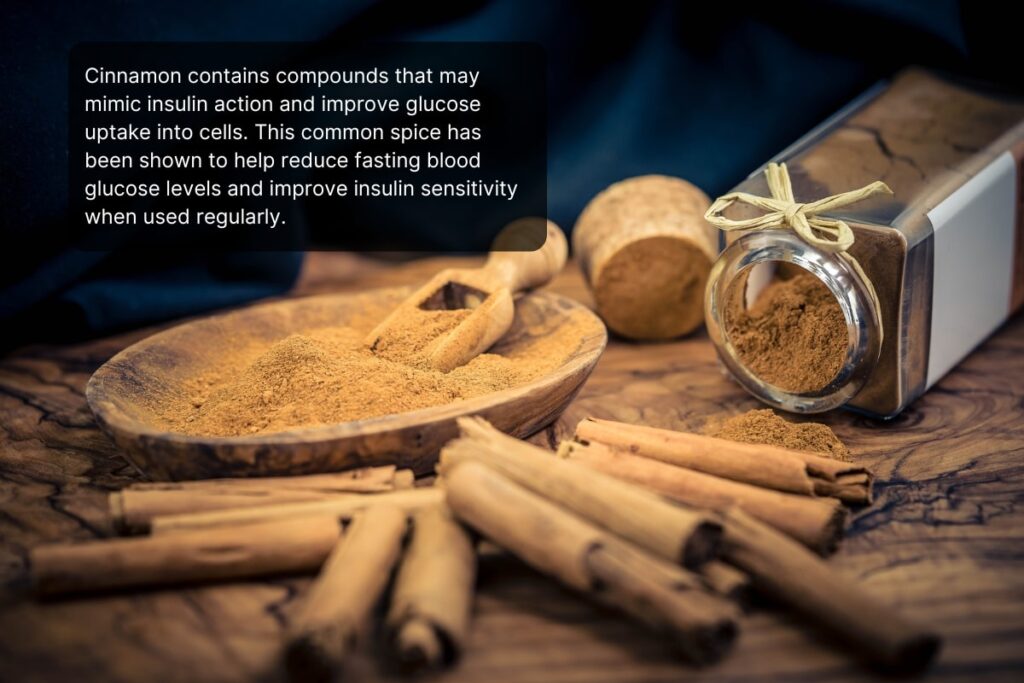
Cinnamon stands out as one of the few culinary spices with substantial research supporting its benefits for insulin sensitivity. This common kitchen ingredient contains bioactive compounds that may help improve glucose metabolism and enhance insulin function, making it an accessible option for those seeking natural support for insulin resistance.
How Cinnamon Supports Insulin Function
Research published in the Annals of Family Medicine found that cinnamon supplementation can improve insulin sensitivity and fasting glucose levels. Cinnamon appears to work through several mechanisms: it may enhance insulin receptor sensitivity, inhibit certain enzymes that inactivate insulin receptors, and slow carbohydrate digestion in the intestines. Additionally, cinnamon contains antioxidant compounds called polyphenols that help reduce oxidative stress, a factor that contributes to insulin resistance.
Not all cinnamon varieties offer the same benefits. Ceylon cinnamon (Cinnamomum verum, also called “true cinnamon”) and Cassia cinnamon (Cinnamomum cassia, the more common variety found in grocery stores) have different properties. Most research showing benefits for insulin sensitivity has used Cassia cinnamon, though Ceylon cinnamon has a better safety profile for long-term use due to its lower coumarin content (a compound that may be harmful to the liver in high doses).
Cinnamon can be easily incorporated into your daily routine. Adding it to morning oatmeal, coffee, tea, or yogurt provides a simple way to include it consistently. It can also be sprinkled on apple slices, added to smoothies, or used in savory dishes like curries and stews. For those seeking more concentrated benefits, water-extracted cinnamon supplements are available, which offer higher potency while removing certain compounds that might cause digestive discomfort.
Cinnamon is generally recognized as safe when used in culinary amounts. However, Cassia cinnamon contains coumarin, which may cause liver problems with long-term use at high doses. Those taking medications that affect blood glucose, blood thinners, or liver medications should consult healthcare providers before using cinnamon supplements. Some individuals may experience allergic reactions or digestive discomfort, particularly with larger amounts.
Zinc: Supporting Insulin Production and Function
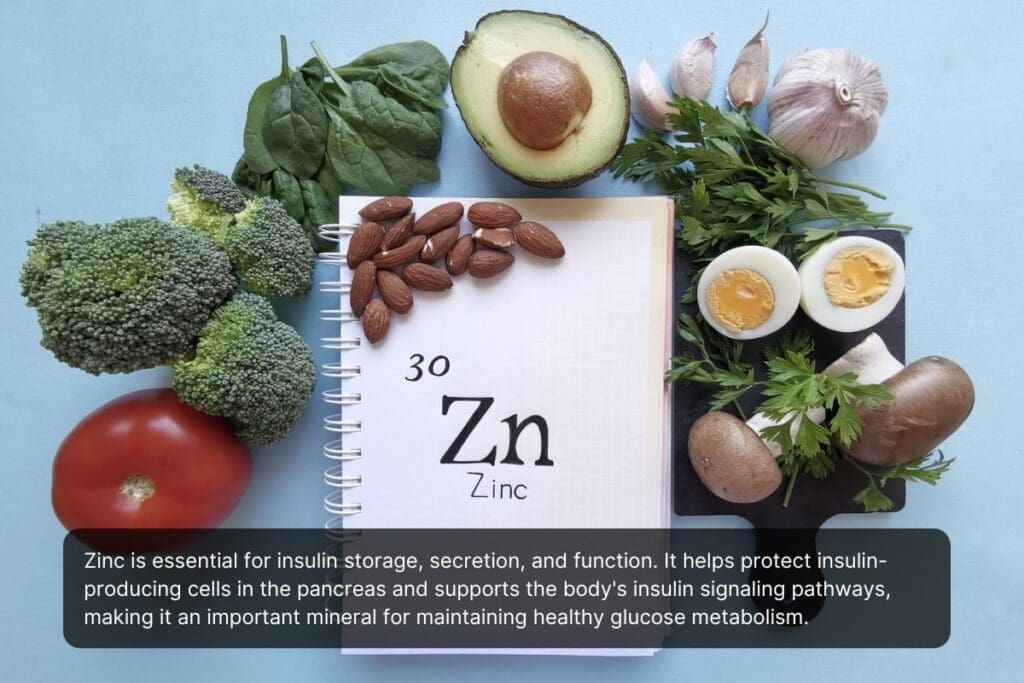
Zinc is an essential trace mineral that plays a crucial role in insulin metabolism. Research has identified zinc as a key component in the synthesis, storage, and secretion of insulin within the pancreas. Beyond its role in insulin production, zinc also influences how effectively insulin works throughout the body, making it a nutrient of particular interest for addressing insulin resistance.
To access the second part of the insulin resistance content, I invite you to use the links below:
- best foods for insulin resistance
- signs of insulin resistance in children
- weight gain and insulin resistance
- insulin resistance and diabetes type 2
- How Long Does It Take to Reverse Insulin Resistance?
- Best cooking oil for cholesterol
How Zinc Enhances Insulin Sensitivity
A meta-analysis published in Biological Trace Element Research found a significant negative correlation between serum zinc levels and insulin resistance in patients with type 2 diabetes, meaning those with lower zinc levels tended to have higher insulin resistance. Zinc appears to help insulin function through several mechanisms. It protects insulin-producing cells in the pancreas from damage, supports insulin receptor function, and activates key pathways involved in glucose transport into cells.
Research indicates that zinc deficiency may contribute to insulin resistance, particularly in women with polycystic ovary syndrome (PCOS). A review of studies on zinc supplementation in PCOS patients found significant improvements in insulin sensitivity and reductions in markers of insulin resistance. Zinc also functions as a cofactor for antioxidant enzymes that protect insulin-signaling molecules from oxidative damage.
When considering zinc supplementation, be aware of potential interactions with other nutrients. Zinc and copper compete for absorption, so long-term high-zinc intake may lead to copper deficiency. High doses of zinc can also reduce iron absorption when taken together. Calcium and zinc may compete for absorption pathways as well. For optimal absorption, avoid taking zinc supplements with high-phytate foods (like whole grains and legumes) or with calcium supplements. Those taking antibiotics or diuretics should consult healthcare providers about timing of zinc supplementation.
Omega-3 Fatty Acids: Fighting Inflammation and Improving Cell Membrane Function
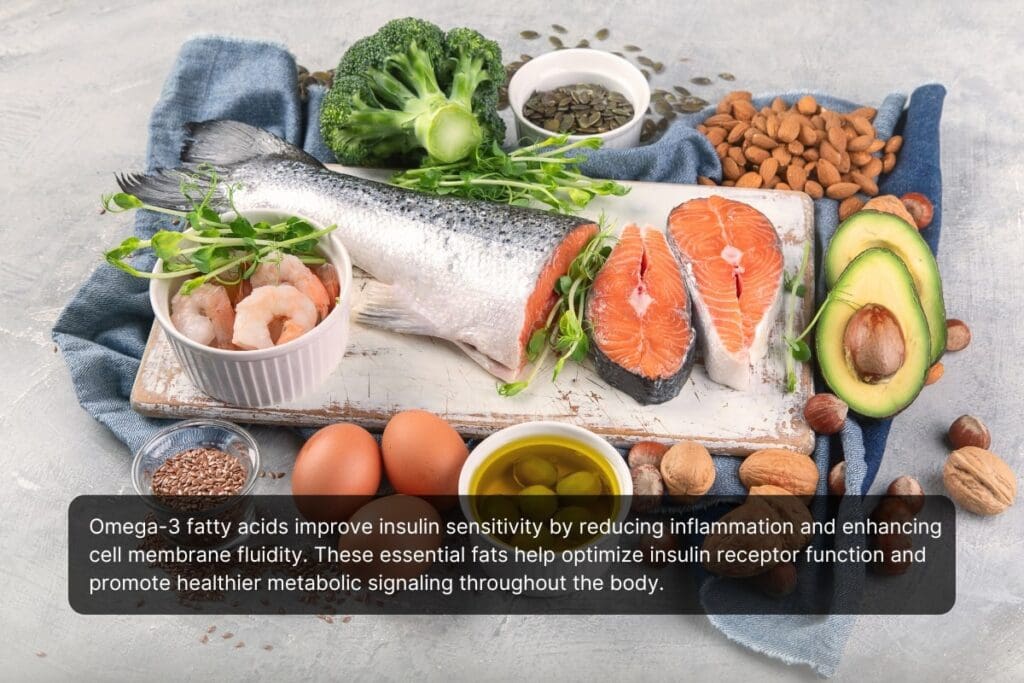
Omega-3 fatty acids are essential polyunsaturated fats that must be obtained from the diet or supplements. The most biologically active forms, EPA (eicosapentaenoic acid) and DHA (docosahexaenoic acid), have received significant attention for their potential to improve insulin sensitivity and support metabolic health.
How Omega-3s Support Insulin Function
Research indicates that omega-3 supplementation can significantly reduce triglycerides and improve insulin sensitivity in individuals at high risk for metabolic disorders. A randomized controlled trial published in Lipids in Health and Disease found that omega-3 fatty acids improved insulin sensitivity in study participants. The benefits appear particularly pronounced in individuals with both insulin resistance and elevated inflammatory markers.
Omega-3 fatty acids support insulin sensitivity through several mechanisms. They improve cell membrane fluidity, which enhances insulin receptor function and signaling. This improved membrane structure allows insulin receptors to change shape more easily when insulin binds, facilitating proper signal transmission. Omega-3s also reduce inflammation by producing specialized compounds called resolvins and protectins, which help resolve inflammatory processes that can interfere with insulin signaling pathways.
While generally safe, omega-3 supplements may have contraindications for certain individuals. Those taking blood-thinning medications should consult healthcare providers before supplementing, as omega-3s have mild anticoagulant effects. Some people experience digestive discomfort, particularly with higher doses or lower-quality supplements. Individuals with seafood allergies should ensure their supplement is free from allergen proteins. Storing omega-3 supplements in the refrigerator helps prevent oxidation, which can reduce effectiveness and cause unpleasant taste or smell.
Natural Supplements for Insulin Resistance
Supplements offer promising support for improving insulin sensitivity when used as part of a comprehensive approach to metabolic health. The evidence is particularly strong for magnesium, berberine, chromium, alpha-lipoic acid, and inositol, with each working through different mechanisms to enhance insulin function. Zinc, cinnamon, and omega-3 fatty acids provide additional options with their own unique benefits for glucose metabolism. While no supplement can replace fundamental lifestyle approaches like proper diet and regular physical activity, these natural compounds may provide valuable complementary support for addressing insulin resistance.
The most effective approach to supplementation for insulin resistance involves selecting high-quality products, introducing supplements methodically, and monitoring your response with appropriate markers. Individual responses vary significantly based on personal biochemistry, underlying causes of insulin resistance, and current metabolic status. For tailored guidance on selecting the most appropriate supplements for your specific metabolic pattern, consider consulting with healthcare providers who specialize in metabolic health at IFitCenter. A personalized assessment can help identify which supplements align best with your unique needs and may enhance your overall success in improving insulin sensitivity.
To access other content on the IFitCenter’s blog, you can use the following links:
References “Supplements for Insulin Resistance”
- Wang, R., Miao, C., Chen, Y., Zhao, Y., Yang, L., Cheng, W., & others. (2022). Antioxidant supplements relieve insulin resistance but do not improve lipid metabolism in women with polycystic ovary syndrome: a meta-analysis of randomized clinical trials. Gynecological Endocrinology, 38(12), 1047–1059. DOI: 10.1080/09513590.2022.2148648
- Yoo, J.-Y., & Yum, K.-S. (2018). Effect of Coenzyme Q10 on Insulin Resistance in Korean Patients with Prediabetes: A Pilot Single-Center, Randomized, Double-Blind, Placebo-Controlled Study. BioMed Research International, 2018, Article ID 1613247. DOI: 10.1155/2018/1613247
- Li, G., Feng, H., Mao, X.-L., Deng, Y.-J., Wang, X.-B., Zhang, Q., Guo, Y., & Xiao, S.-M. (2023). The effects of probiotics supplementation on glycaemic control among adults with type 2 diabetes mellitus: a systematic review and meta-analysis of randomised clinical trials. Journal of Translational Medicine, 21(442). DOI: 10.1186/s12967-023-04306-0
- Nasiadek, M., Stragierowicz, J., Klimczak, M., & Kilanowicz, A. (2020). The Role of Zinc in Selected Female Reproductive System Disorders. Nutrients, 12(8), 2464. DOI: 10.3390/nu12082464
- Thota, R. N., Rosato, J. I., Dias, C. B., Burrows, T. L., Martins, R. N., & Garg, M. L. (2020). Dietary Supplementation with Curcumin Reduces Circulating Levels of Glycogen Synthase Kinase-3β and Islet Amyloid Polypeptide in Adults with High Risk of Type 2 Diabetes and Alzheimer’s Disease. Nutrients, 12(4), 1032. DOI: 10.3390/nu12041032
- Veronese, N., Dominguez, L. J., Pizzol, D., Demurtas, J., Smith, L., & Barbagallo, M. (2021). Oral Magnesium Supplementation for Treating Glucose Metabolism Parameters in People with or at Risk of Diabetes: A Systematic Review and Meta-Analysis of Double-Blind Randomized Controlled Trials. Nutrients, 13(11), 4074. DOI: 10.3390/nu13114074
- Thota, R. N., Acharya, S. H., & Garg, M. L. (2019). Curcumin and/or omega-3 polyunsaturated fatty acids supplementation reduces insulin resistance and blood lipids in individuals with high risk of type 2 diabetes: a randomised controlled trial. Lipids in Health and Disease, 18(31). DOI: 10.1186/s12944-019-0967-x




6 comments
tina
I have PCOS with significant insulin resistance that hasn’t responded well to diet alone. Your section on inositol caught my attention. What’s the typical timeframe to see results with inositol for PCOS symptoms, and should I be looking for a specific ratio of myo-inositol to D-chiro-inositol?
Dr.babak Jamalian
PCOS with insulin resistance can indeed be challenging to manage with dietary interventions alone. Regarding inositol, most clinical studies show that women begin experiencing improvements in insulin sensitivity markers within 8-12 weeks of consistent supplementation. Changes in menstrual regularity, if applicable, may take 3-6 months to become apparent.
As for the formulation, research suggests that a combination of myo-inositol (MI) and D-chiro-inositol (DCI) in a physiological ratio of 40:1 most closely mimics normal ovarian function. This ratio appears to work better than either form alone, particularly for addressing both the metabolic and reproductive aspects of PCOS.
The recommended dosage is typically 2 grams twice daily (total 4g/day), taken before meals. I would suggest consulting with your healthcare provider about monitoring appropriate markers of improvement, including fasting insulin, glucose tolerance, and possibly hormonal parameters specific to PCOS.
mary
I’m currently taking losartan for high blood pressure and metformin for pre-diabetes. Would it be safe to add berberine to my regimen, or could there be dangerous interactions? What should I watch out for?
Dr.babak Jamalian
I appreciate your caution regarding potential drug interactions, which is absolutely warranted with berberine. Berberine is known to inhibit certain liver enzymes (specifically cytochrome P450 enzymes) that metabolize many medications. With losartan specifically, berberine may decrease how quickly your body processes this medication, potentially affecting its efficacy. The combination of berberine with metformin requires particular attention, as both have glucose-lowering effects and could potentially cause hypoglycemia.
Additionally, berberine may enhance the blood pressure-lowering effects of losartan. In your case with multiple medications, I would strongly recommend consulting with your healthcare provider before adding berberine to your regimen. They may need to monitor your blood pressure and glucose levels more closely and potentially adjust your medication dosages if berberine is incorporated.
yaasmeen
Dr. Jamalian, I’m interested in trying magnesium supplements for my insulin resistance. What dosage would you recommend, and which form of magnesium would be most effective for improving insulin sensitivity? Thanks for the informative article!
Dr.babak Jamalian
Thank you for your question about magnesium supplementation. For adults with insulin resistance, clinical research supports a daily dosage of 300-400 mg of elemental magnesium. In one significant clinical trial, 300 mg of elemental magnesium daily improved insulin sensitivity and metabolic parameters in patients with type 2 diabetes. As mentioned in the article, magnesium citrate and glycinate forms generally offer better absorption compared to magnesium oxide, making them preferable for addressing insulin resistance. Individual needs may vary based on your current magnesium status and other health factors, so I recommend consulting with your healthcare provider before beginning supplementation, especially if you’re taking other medications.